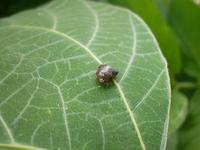-
Schools do not offer students sufficient practical science experience

New evidence shows that a worrying number of students are not experiencing a complete and authentic education in the sciences, due to a lack of resources for practical work. Secondary schools reported not having enough of some of the most commonly used equipment, such as microscopes, eye protection, and connecting leads for circuits. The research also shows that many secondary schools lack essential support from qualified technicians to carry out practical work.
-
-
Horse meat in the human diet
Horse long has been on menus in continental Europe, sold from shops that often advertise with a carved horse head on the store front.A chemist explains the testing for horse DNA in food products, and discusses the concerns about selling and eating horse meat in the United States.
-
-
New fertilizer can be used to grow food – but not build bombs

Ammonium nitrate fertilizer is used in agriculture, but when mixed with a fuel such as diesel, it is highly explosive. It was used in about 65 percent of the 16,300 homemade IEDs in Afghanistan in 2012.About 1,900 troops were killed or wounded in IED attacks in 2012, 60 percent of American combat casualties. There have been more than 17,000 global IED incidents in 123 countries in the past two years. Timothy McVeigh used ammonium nitrate in Oklahoma City in 1995. Scientists have developed a fertilizer that helps plants grow but cannot detonate a bomb.
-
-
Volatility of food prices is still a mystery
Riots, political instability, and a spike in malnourishment cases blighted the years 2007 and 2008, particularly in developing countries. The cause was a sudden surge in global food prices, with rice eventually rising several hundred per cent as importing countries simply could not get enough of this basic foodstuff.Food market volatility has yet to be understood, and there is no definite proof that it is due to speculators.
-
-
Office implementing Obamacare avoids furloughs
Gary Cohen, the director of the Center for Consumer Information and Insurance Oversight, said Wednesday that his office will not be furloughing its workers due to the federal budget cuts known as the sequester. His office is in charge of implementing most of President Obama’s healthcare law.
-
-
Preventing bugs from becoming antibiotic-resistant
About 440 000 new cases of drug-resistant tuberculosis emerge annually, causing around 150 000 deaths. New research finds that bacteria can evolve resistance more quickly when stronger antibiotics are used. The rate of evolution of antibiotic resistance speeds up when potent treatments are given because resistant bacterial cells flourish most during the most aggressive therapies.
-
-
Fighting superbugs with a new genre of antibodies
In an advance toward coping with bacteria that shrug off existing antibiotics and sterilization methods, scientists are reporting development of a new family of selective antimicrobial agents that do not rely on traditional antibiotics.
-
-
U.S. hospitals shipping sick immigrants back to their home countries

Hundreds of immigrants who are in the United States illegally end up in the hospital only to find out they will be sent home through a removal system run by hospitals trying to avoid the high cost of treating illegal immigrants.
-
-
New detection test to improve food safety, bioterrorism defense
Sales of chicken products in China plummeted recently during an outbreak of a deadly new strain of bird flu. From bird flu to mad cow disease, numerous food scares have made global headlines in recent years.Scientists develop new detection technique which wouldmake food contamination testing more rapid and accurate. The detection test could also accelerate warnings after bioterrorism attacks.
-
-
Interior Dept. releases progress report on U.S. Water Census
The U.S. Interior Department issued released a report to Congress on the progress of the National Water Census. As competition for water grows — for irrigation of crops, for use by cities and communities, for energy production, and for the environment — the need for the National Water Census and related information and tools to aid water resource managers also grows. The Water Census will assist water and resource managers in understanding and quantifying water supply and demand, and will support more sustainable management of water resources.
-
-
Mississippi man arrested for sending ricin letters to Obama, Sen. Wicker
The FBI confirmed yesterday (Wednesday) that a letter addressed to President Obama was found to contain the toxin ricin. As is the case with all the mail sent to the White House, the letter was screened in a remote mail sorting facility in Anacostia, a neighborhood in southeast Washington, D.C., and intercepted. The FBI arrested a man from Tupelo, Mississippi, on suspicion that he was behind the ricin letters to the White House and to Senator Roger Wicker (R-Mississippi), who lives in Tupelo.
-
-
Experts will meet in September for the bi-annual anthrax research conference
More than 300 scientists and researchers from all over the world who work on Bacillus anthracis, the causative agent of anthrax, and B. cereus and B. thuringiensis, two closely related bacilli, will be heading to Victoria, British Columbia for the Bacillus ACT 2013 conference, which will be held 1-5 September.
-
-
Deadly wheat disease threats global food supplies
Disease-resistant wheat developed over the past half century helped ensure steady world food supplies, but a global research team warns that without increased financial support for disease resistance research, new strains of a deadly fungal disease could leave millions without affordable access to food.
-
-
Invasive kudzu bugs pose greater threat than previously thought

The invasive kudzu bug has the potential to be a major agricultural pest, causing significant damage to economically important soybean crops. Conventional wisdom has held that the insect pests will be limited to areas in the southern United States, but new research shows that they may be able to expand into other parts of the country.
-
-
New bird flu strain adapting to mammals, humans
Influenza virus depends on its ability to attach to and commandeer the living cells of its host to replicate and spread efficiently. Avian influenza rarely infects humans, but can sometimes adapt to people, posing a significant risk to human health. A genetic analysis of the avian flu virus responsible for at least nine human deaths in China portrays a virus evolving to adapt to human cells, raising concern about its potential to spark a new global flu pandemic.
-
More headlines
The long view
Ransomware Attacks: Death Threats, Endangered Patients and Millions of Dollars in Damages
A ransomware attack on Change Healthcare, a company that processes 15 billion health care transactions annually and deals with 1 in 3 patient records in the United States, is continuing to cause massive disruptions nearly three weeks later. The incident, which started on February 21, has been called the “most significant cyberattack on the U.S. health care system” by the American Hospital Association. It is just the latest example of an increasing trend.
